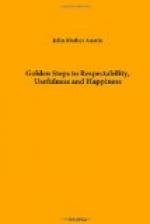“By common sense, as used in this place, I mean the faculty by means of which we see things as they really are. It implies judgment and discrimination, and a proper sense of propriety in regard to the common concerns of life. It leads us to form judicious plans of action, and to be governed by our circumstances in such a way as will be generally approved. It is the exercise of reason, uninfluenced by passion or prejudice. To man, it is nearly what instinct is to brutes. It is very different from genius or talent, as they are commonly defined; but much better than either. It never blazes forth with the splendor of noon, but shines with a constant and useful light. To the housewife—but, above all, to the mother,—it is indispensable.
“Whatever other recommendations a lady may possess, she should have an inextinguishable thirst for improvement. No sensible person can be truly happy in the world, without this; much less qualified to make others happy. But the genuine spirit of improvement, wherever it exists, atones for the absence of many qualities which would otherwise be indispensable: in this respect resembling that ‘charity’ which covers ‘a multitude of sins.’ Without it, almost everything would be of little consequence,—with it, everything else is rendered doubly valuable.
“One would think that every sensible person, of either sex, would aspire at improvement, were it merely to avoid the shame of being stationary like the brutes. Above all, it is most surprising that any lady should be satisfied to pass a day or even an hour without mental and moral progress. It is no discredit to the lower animals that—’their little all flows in at once,’ that ’in ages they no more can know, or covet or enjoy,’ for this is the legitimate result of the physical constitution which God has given them. But it is far otherwise with the masters and mistresses of creation; for
“’Were man to
live coeval with the sun,
The patriarch pupil
should be learning still,
And dying, leave his
lessons half unlearnt.’
“There are,—I am sorry to say it—not a few of both sexes who never appear to breathe out one hearty desire to rise, intellectually or morally, with a view to the government of themselves or others. They love themselves supremely—their friends subordinately—their neighbors, perhaps not at all. But neither the love they bear to themselves or others even leads them to a single series of any sort of action which has for its ultimate object the improvement of anything higher than the condition of the mere animal. Dress, personal appearance, equipage, style of a dwelling or its furniture, with no other view, however, than the promotion of mere physical enjoyment, is the height of their desires for improvement!




